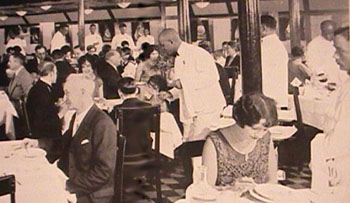

|
Reflections on Black History ______ Part 33 |
Stopover in Seattle
by Thomas C. Fleming, May 6, 1998
In the 1920s, the coastwise passenger ship industry on the Atlantic and Pacific oceans hired hundreds of black and white college students during the summer tourist trade, as did those splendid ships that plied the waters of the Great Lakes. Colonial Dining Saloon on the H.F. Alexander seated 270. In school, you were largely separated outside the classroom anyway. You developed some friendships with whites, and you went places with them, but that wasn't done on a large scale. In 1926, my first trip as a bellhop on the Emma Alexander of the Admiral Line cemented my friendship with a waiter, Bill Narcisse, who was in his junior year at the University of Southern California. Narcisse began to open up a new world to me. It was the first time I had associated with black college students and gotten close to them. We took to one another, since most of the other black crew members had not gone past the sixth grade. A lot of them came from the South, where they had much worse education than in the West. I was an 18-year-old high school graduate and I thought I knew more than they did. They saw me reading the newspaper, and judging from their speech, it seemed that they could barely read. Ralph Bunche was then a graduate student at the University of California at Los Angeles. Bill told me that he was working that summer as a waiter on the H.F. Alexander, the flagship of the Admiral Line. Bill knew him in Los Angeles, because there weren't a lot of blacks going to UCLA or USC. I never ran across Bunche that summer, but the fellows talked about his scholastic brilliance, and he was well known by the college crowd even at Berkeley, almost 400 miles north of Los Angeles. I met Ralph two years later, as another hand in a bridge game, when he came to Berkeley to visit the home of Leonard Richardson, the most successful black attorney practicing law in Northern California. I was a close family friend of the Richardsons, and Bunche visited them when he came up from Los Angeles, which he did occasionally. I found him to be a very proud young man, with an easy personality. Little did I know how famous he would become. After he received his doctorate at UCLA, Bunche became a professor in the political science department at Howard University. Later the U.S. State Department looked at him and started using him, and he ended up at the United Nations, where he became U.N. mediator in Palestine. For his work in bringing about a truce between Arabs and Jews in the new nation state of Israel, he was awarded the Nobel Peace Prize in 1950, the first black person to receive that honor. Now back to the Emma Alexander. Bellhops worked all day, from early morning until late at night. The only time we got a day off was when the ship was in port. When we got to Seattle, which was the home port of the Admiral Line, we could go on shore, and I got a chance to explore the city. It was my first visit to the state of Washington, and I found the Jim Crow patterns not to be as strict as they were in California; the atmosphere was much healthier than in the San Francisco Bay Area. In Seattle, blacks could stay in any of the hotels in the city, and they weren't refused service in any restaurants, according to some of the black people I met. I saw something else in Seattle which was mind-boggling to me when I visited the Union railroad station -- white men employed as redcap porters. As young as I was, I thought that only black men were hired for those jobs. Washington was one of the few states that had no legal bars on interracial marriages. I saw blacks with definite signs of Asian and white blood coursing through their veins, and mixed couples, with some Chinese males married to black women. Interracial marriages were not legal in California until years after World War II. The ship lay overnight in Tacoma, about 25 miles south of Seattle. The Emma did not stop in Portland, Oregon on the way south, and I didn't visit the city until two years later, when I was working for the Southern Pacific Railroad. On that occasion, I got off in Portland because one of the dining car waiters knew his way around. He asked me to go with him to one of the Fox West Coast theaters, which showed both stage acts and motion pictures. We paid our fares and started in. I headed for a seat downstairs and the female usher told me, "There's lots of seats upstairs." So I looked, and I said, "It looks to me there's a lot of vacant seats downstairs too." She said, "Your kind can't sit downstairs." I never encountered that in California. I asked her to call the manager and she did. He told me, "You can either sit upstairs or you can get a refund." I said I wanted a refund. My friend stayed, because he'd been there before and he didn't mind. But I voiced my opposition to it constantly, all my life.
Copyright © 1998 by Thomas Fleming. Email. At 90, Fleming continues to write each week for the Sun-Reporter, San Francisco's African American weekly, which he co-founded in 1944. A 48-page book of his stories and photos from 1907-19 is available for $3, including postage. Send mailing address.
Fleming Biography More Fleming articles Back to Front Page |